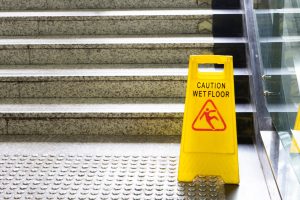The Occupiers Liability Act 1957 is an Act of Parliament. It outlines the duty of care for those in control of areas open to the public. It states that those who operate public spaces must take steps and implement measures to ensure the reasonable safety of those using the area as intended.
This legislation requires individuals and organisations in control of spaces accessed by the public in England, Wales and Northern Ireland to provide safe facilities and services. If an occupier fails to meet this duty of care and you sustain an injury as a result, you could have good grounds to file a personal injury claim. If a customer or member of the public decides to seek compensation for personal injury, they need to demonstrate the following criteria:
- That a duty of care as set by the Occupiers’ Liability Act 1957 applied in that public place.
- The occupier failed to meet the duty of care. For example, a supermarket failed to consider the location of a fixed or movable structure that made it impossible for more than one person at a time to pass through a high-traffic area.
- The injured person can prove physical and/or psychological harm resulted. For example, as a result of being unable to pass through an area, a shelving unit fell on a lawful visitor, causing various injuries.
The term ‘reasonable safety’ means that occupiers must anticipate safety risks and regularly check for them. They should assess not just potential hazards, but act in a prompt manner to any that are brought to their attention. Some examples include:
- Carrying out repairs on fixtures and fittings as soon as possible and taking the area out of use until it can be made safe.
- Providing clear signage for unavoidable hazards such as low ceilings or deep water.
- Take into account that children are less able to accurately assess their personal safety. Therefore, extra safety provisions should be made for them.
- Alert the general public to hot surfaces, for example, to avoid the risk of a restaurant accident.
Accidents in public places can still occur, even when the occupier implements reasonable measures to ensure the safety of lawful visitors. For example, the occupier may have ensured that a wet floor sign was in place. However, this did not stop a member of the public from walking across it and slipping.
Examples
It is important to note that occupiers are not automatically responsible for every accident that happens on their premises. For instance, a personal injury claim might be harder to prove if a visitor was injured after misusing the facilities. For example, a member of the public suffered a burn injury by entering the staff-only area of a cinema because it contained a popcorn maker that only employees were trained to use.
Also, if the occupier was having repair or construction work carried out, and the contractor failed to take reasonable care to safeguard the area, liability may lay elsewhere. For example, a builder might have left dangerous equipment in an area that can be accessed by the public. A child may have sustained severe cuts leading to permanent scarring when they found the saw.
A valid claim for compensation based on a breach in the occupiers’ duty of care as set by the Occupiers Liability Act 1957 is outlined in the following examples:
- The occupier failed to repair broken tiles on a staircase at a bar or in a pub despite knowing about the problem. Because of this, a customer slipped and suffered a back injury.
- When a wet floor is left without warning signs in a supermarket. A customer slips and shatters their knee as a consequence.
- Staff at a local authority or private swimming pool are not properly trained to deal with safety issues. A young swimmer nearly drowns because of this failure and sustains mental health injuries.

A public liability solicitor can assist claimants in seeking compensation for occupiers liability cases. Would you like help on understanding your options after an accident in a public place? Please connect with our dedicated advisors on the number above. If it seems like you have reasonable grounds to claim compensation, they can connect you to one of the No Win No Fee solicitors from our panel.
In addition to the Occupiers’ Liability Act 1957 part of our Legal Glossary, you may find these other external resources of use:
- Perhaps you have needed to take time off work. This GOV.UK resource explains Statutory Sick Pay (SSP) to help with any loss of earnings.
- Here, the Royal Society for the Prevention of Accidents (RoSPA) explains its vision on preventing injury and accidents.
- Finally, this guide to falls from the NHS may help.


